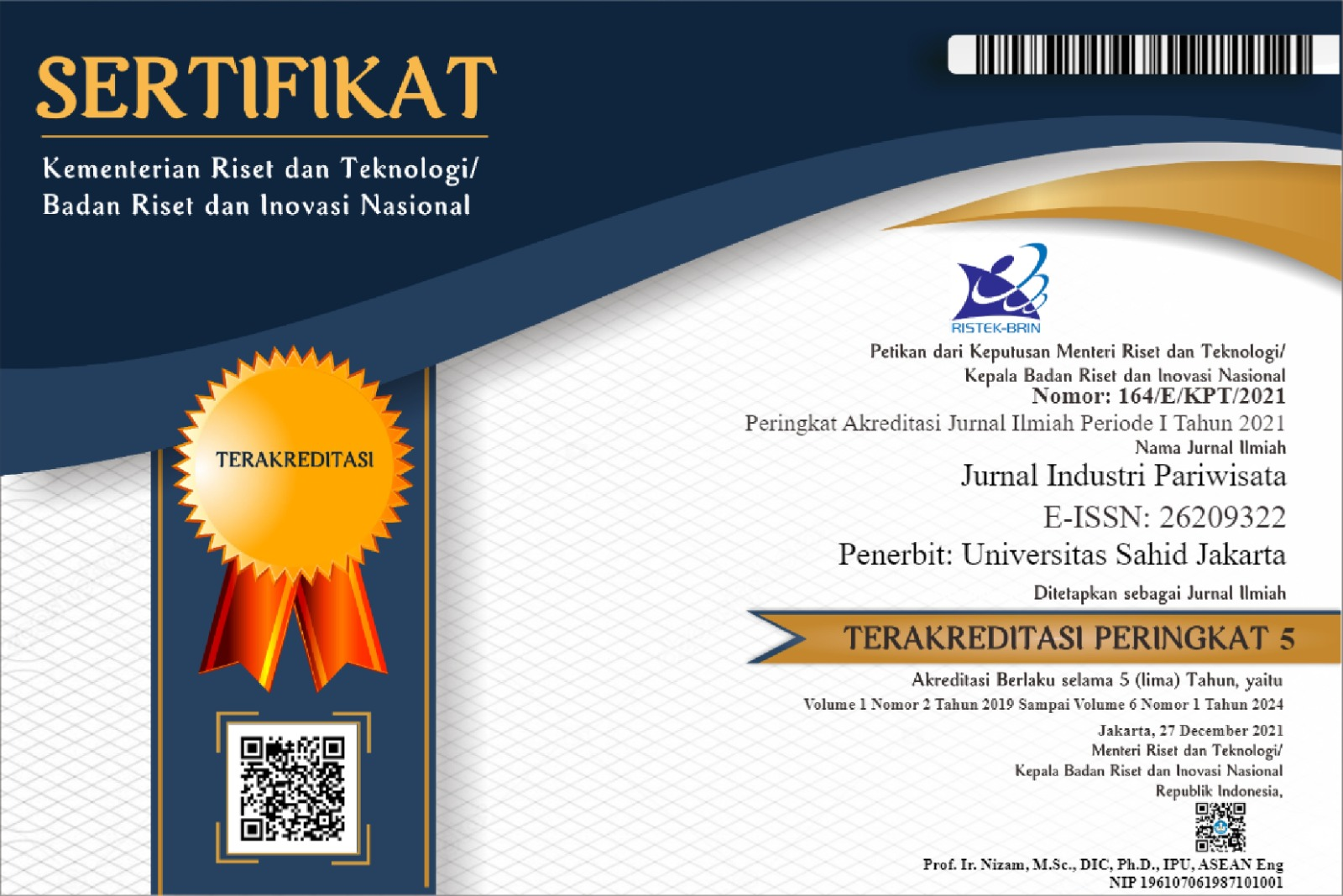FAKTOR-FAKTOR YANG MEMPENGARUHI PENGEMBANGAN SMART TOURISM DI KOTA SEMARANG
Keywords:
Smart tourism; Smart city; Destinasi Inovatif; Inovasi Non-TI; TeknologiAbstract
Penelitian ini bertujuan untuk mengidentifikasi faktor-faktor yang mempengaruhi pengembangan Smart tourism di Kota Semarang dan menguraikan bagaimana keberjalanannya hingga saat ini. Penelitian ini menggunakan pendekatan kualitatif. Data dikumpulkan melalui proses wawancara dan pengumpulan data sekunder. Wawancara dilakukan dengan perwakilan pemerintah dan perwakilan pelaku kegiatan pariwisata di kota ini. Content analysis digunakan sebagai teknik analisis dalam penelitian ini. Hasil penelitian menunjukkan bahwa Smart tourism merupakan bagian yang tak terpisahkan dari implementasi smart city di Kota Semarang. Dalam implementasinya di Kota Semarang, Smart tourism lebih banyak didominasi oleh inovasi non-TI dalam pengembangan destinasi inovatif. Terdapat tujuh faktor yang mempengaruhi pengembangan Smart tourism ini di Kota Semarang yakni kepemimpinan, landasan hukum, kolaborasi antar OPD dan berbagai pihak terlibat, SDM pegawai pemerintah, partisipasi masyarakat, anggaran biaya, serta inovasi. Hingga saat ini, Smart tourism masih dalam tahap pengembangan. Meskipun demikian masih ditemukan beberapa kendala yang perlu untuk dioptimalkan oleh pemerintah kota seperti pemanfaatan teknologi dan integrasinya dalam menyediakan lebih banyak data/informasi pariwisata yang dapat digunakan dalam pengembangannya serta dalam memudahkan dan meningkatkan pengalaman berkunjung wisatawan; membina lebih banyak lagi aktor-aktor lokal yang dapat menginisiasi dan menjaga keberlajutan program-program pariwisata berbasis masyarakat; serta mengarahkan program-program Smart tourism pada tujuan akhir yakni keberlanjutan dan juga kualitas hidup.References
Akdu, U. (2020). Smart tourism: Issues, Challenges and Opportunities. The Emerald Handbook of ICT in Tourism and Hospitality, 291–308. https://doi.org/10.1108/978-1-83982-688-720201018
Boes, K., Buhalis, D., & Inversini, A. (2015). Conceptualising Smart tourism Destination Dimensions. In Information and Communication Technologies in Tourism 2015 (pp. 391–403). Springer International Publishing. https://doi.org/10.1007/978-3-319-14343-9_29
Cardoso, I. B. F., & Ruiz, T. C. D. (2021). Smart Tourism Destinations - A case study of Seoul, South Korea. Applied Tourism, 6(1), 36–44. https://doi.org/10.14210/at.v6n1.p36-44
Crouch, G. I. (2011). Destination competitiveness: An analysis of determinant attributes. Journal of Travel Research, 50(1), 27–45. https://doi.org/10.1177/0047287510362776
Damayanti, M., Tyas, W. P., & Aswad, W. O. S. J. (2021). Conceptualizing multi actors’ collaboration in Smart tourism destination. IOP Conference Series: Earth and Environmental Science, 673(1). https://doi.org/10.1088/1755-1315/673/1/012027
Damayanti, M., Wahyono, H., Rahdriawan, M., Tyas, W. P., Sani, P. C., & Riptek, J. (2020). Penerapan Smart Tourism Di Kota Semarang. Jurnal Riptek, 14(2), 128–133. http://riptek.semarangkota.go.id
Errichiello, L., & Micera, R. (2021). A process-based perspective of Smart tourism destination governance. European Journal of Tourism Research, 29(2021). https://doi.org/10.54055/ejtr.v29i.2436
Fajriyah, N. O., & Djunaedi, A. (2021). The Transformation of Smart city Concept in Urban Development (Case Study: Semarang City). IOP Conference Series: Earth and Environmental Science, 764(1). https://doi.org/10.1088/1755-1315/764/1/012028
González-Reverté, F. (2019). Building sustainable smart destinations: An approach based on the development of spanish Smart tourism plans. Sustainability, 11(23), 1–24. https://doi.org/10.3390/SU11236874
Gretzel, U., Sigala, M., Xiang, Z., & Koo, C. (2015). Smart tourism: foundations and developments. Electronic Markets, 25(3), 179–188. https://doi.org/10.1007/s12525-015-0196-8
Hollands, R. G. (2008). Will the real smart city please stand up? Intelligent, progressive or entrepreneurial? City, 12(3), 303–320. https://doi.org/10.1080/13604810802479126
Jasrotia, A., & Gangotia, A. (2018). Smart cities to Smart tourism destinations: A review paper. Journal of Tourism Intelligence and Smartness, 1(1), 47–56. https://dergipark.org.tr/en/pub/jtis/issue/39024/446754
Kaharuddin. (2021). Kualitatif : Ciri dan Karakter Sebagai Metodologi. Jurnal Pendidikan, IX(1), 2–8. http://journal.unismuh.ac.id/index.php/equilibrium
Kesar, S., Abraham, R., Lahoti, R., Nath, P., & Basole, A. (2021). Pandemic, informality, and vulnerability: impact of COVID-19 on livelihoods in India. Canadian Journal of Development Studies, 42(1–2), 145–164. https://doi.org/10.1080/02255189.2021.1890003
Khan, M. S., Woo, M., Nam, K., & Chathoth, P. K. (2017). Smart city and Smart tourism: A case of Dubai. Sustainability (Switzerland), 9(12). https://doi.org/10.3390/su9122279
Lee, P., Hunter, W. C., & Chung, N. (2020). Smart tourism city: Developments and transformations. Sustainability (Switzerland), 12(10). https://doi.org/10.3390/SU12103958
Lestari, F., Dali, M. M., & Che-Ha, N. (2023). Towards Smart tourism Development in City Branding Era in Indonesia. 3(1), 218–230. https://doi.org/10.2991/978-2-494069-07-7
Meiyanti, R., Sensuse, D. I., & Sucahyo, Y. G. (2021). The Main Component of Smart tourism: A Principal Component Analysis Approach. Webology, 18(2), 295–307. https://doi.org/10.14704/web/v18i2/web18322
Rayyan, M. A., Octaviawan, A., & Billiyanto, R. (2019). From “ Smart city ” to “ Smart tourism ” : Developing The Role of Tourism in Asia. 7th Asian Academic Society International Conference, 67–74.
Savić, J., & Pavlović, G. (2018). Analysis of factors of Smart tourism development in Serbia. Menadzment u Hotelijerstvu i Turizmu, 6(1), 81–91. https://doi.org/10.5937/menhottur1801081s
Wang, X., Zhen, F., Tang, J., Shen, L., & Liu, D. (2022). Applications, Experiences, and Challenges of Smart tourism Development in China. Journal of Urban Technology, 29(4), 101–126. https://doi.org/10.1080/10630732.2021.1879605
Ye, H., Zhang, K., & Law, R. (2021). A Framework of Implications for Smart tourism Development in Hong Kong. Ye, Huiyue Zhang, Ke Law, Rob, 1(1), 31–39. https://doi.org/10.52255/smarttourism.2021.1.1.5

Published
Issue
Section
Copyright (c) 2025 Shinta Putri

This work is licensed under a Creative Commons Attribution-NonCommercial 4.0 International License.
Authors who publish with this journal agree to the following terms:
- Authors retain copyright and grant the journal right of first publication with the work simultaneously licensed under a Lisensi Creative Commons Atribusi-BerbagiSerupa 4.0 Internasional. that allows others to share the work with an acknowledgement of the works authorship and initial publication in this journal.
- Authors are able to enter into separate, additional contractual arrangements for the non-exclusive distribution of the journals published version of the work (e.g., post it to an institutional repository or publish it in a book), with an acknowledgement of its initial publication in this journal.
- Authors are permitted and encouraged to post their work online (e.g., in institutional repositories or on their website) prior to and during the submission process, as it can lead to productive exchanges, as well as earlier and greater citation of published work (See The Effect of Open Access).










